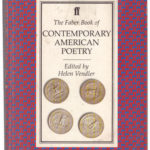Price and stock to confirm
Ed. Faber and Faber, 1990. Size 20 x 13 cm. State: Used, very good. 440 pages
 By Helen Vendler
By Helen Vendler
Cambridge, 1985
In life, most written language is deliberately processed into neutrality so as to be forgotten as fast as possible in favor of the deposit of information it leaves behind; and the spoken language melts into air, unshaped and unremembered -except by writers. Only the ear of the writer is, as Keats said, «open like a greedy shark» to catch the tunings of historical language. Though no writer ends there, that is where all writers begin.
This collection preserves, then, some of the American language of the twentieth century. It is a language that has assimilated the syncopation of jazz, the stylishness of advertising, the technicalities of psychoanalysis, the simplicities of rural speech, the discourse of the university disciplines, the technology of the engineer, the banalities of journalism. These have been recorded in our novels too, where the vernacular thrives and where the rhythms of American life -urgent and moisy and irregular in the cities, more long-breathed in the countryside- have found a place. But poetry offers us something different from the novel, because it engages constantly in a strange process of self-interruption, its pause at the end of each line.
While the novel, unstoppable, wants to keep reeling us into its labyrinth, the unjustified margin of poetry pulls us up, even if gently, at the end of each line. (Even the prose poem, by its sheer density, forces an interruption on us at the end of each sentence, a practice that would be fatal to a novel). In the perpetual self-halting of poetry must lie the ground of its peculiar attraction.
All the poets included here attempt that accuracy -of perception, of style- that makes a new poetry. When a new reality is born and exerts its pressure on poets, their resisting pressure of language and imagination generates a new poetic. The reality our poets have found in America (in this century as before) is, first and foremost, the American climate and landscape, so various as to defeat expression entirely if one were to use only the principal English vocabulary of lark, primrose, and cottage farm. The second reality is the American language, its dialects and regional rhythms; third, American political ideals as they adjust to political reality; fourth, the ambivalent relation of Americans to their parent cultures and to European history; and fifth, the various new readings of experience suggested by contemporary science, psychology, and anthropology. Some of these pressures are felt everywhere in the world; some are peculiar to America.
The symbolic strength of poetry consists in giving presence, through linguistic signs, to absent realities, while insiting, by the very brilliance of poetic style, on the linguistic nature of its own being and the illusionistic character of its effects. The poem stands before us brilliantly photographic and brilliantly verbal at once. If it were not also a shape solid with yearning and written in light, a shaped formed by both heart and mind, it would expend its mimetic and verbal energies in vain. «The poetry of a people», said T. S. Eliot, «takes its life from the people’s speech and in turn gives life to it; and represents its highest point of consciousness, its greatest power and its most delicate sensibility». The poems in this volume represent American speech brought to that mastery and endowed with that life.
CONTENTS
Introduction: Contemporary American Poetry
Wallace Stevens
Langston Hughes
Theodore Rothke
Eilzabeth Bishop
Robert Hayden
Randall Jarrell
John Berryman
Robert Lowell
Howard Nemerov
Amy Clampitt
Richard Wilbur
James Dickey
A. R. Ammons
Allen Ginsberg
James Merrill
Frank O’Hara
John Ashbery
W. S. Merwin
James Wright
Anne Sexton
Adrienne Rich
Gary Snyder
Sylvia Plath
Mark Strand
Charles Wright
Michael Harper
Charles Simic
Frank Bidart
Robert Pinsky
Dave Smith
Louise Glück
Albert Goldbarth
Michael Blumenthal
Jorie Graham
Rita Dove
Biographies
Index of first lines
Index of titles
